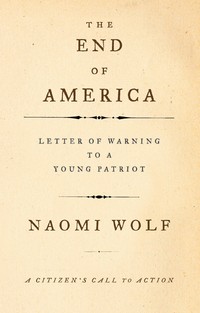
Naomi Rebekah Wolf is an American feminist author, journalist, and conspiracy theorist.

Naomi Klein is a Canadian author, social activist, and filmmaker known for her political analyses, support of ecofeminism, organized labour, leftism and criticism of corporate globalization, fascism, ecofascism and capitalism. As of 2021 she is Associate Professor, and Professor of Climate Justice at the University of British Columbia, co-directing a Centre for Climate Justice.

Starship Troopers is a military science fiction novel by American writer Robert A. Heinlein. Written in a few weeks in reaction to the US suspending nuclear tests, the story was first published as a two-part serial in The Magazine of Fantasy & Science Fiction as Starship Soldier, and published as a book by G. P. Putnam's Sons on November 5, 1959.

It Can't Happen Here is a 1935 dystopian political novel by American author Sinclair Lewis. Set in the fictionalized version of 1930s United States, it follows an American politician, Berzelius "Buzz" Windrip, who quickly rises to power to become the country's first outright dictator and Doremus Jessup, a newspaper editor who sees Windrip's fascist policies for what they are ahead of time and who becomes Windrip's most ardent critic. The novel was adapted into a play by Lewis and John C. Moffitt in 1936.

The Anarchist Cookbook, first published in 1971, is a book containing instructions for the manufacture of explosives, rudimentary telecommunications phreaking devices, and related weapons, as well as instructions for the home manufacture of illicit drugs, including LSD. It was written by William Powell at the apex of the counterculture era to protest against United States's involvement in the Vietnam War. Powell converted to Anglicanism in 1976 and later attempted to have the book removed from circulation. However, the copyright belonged to the publisher, who continued circulation until the company was acquired in 1991. Its legality has been questioned in several jurisdictions.

Avram David "Avi" Lewis is a Canadian documentary filmmaker, former host of the Al Jazeera English show Fault Lines and former host of the Canadian Broadcasting Corporation (CBC) current-affairs programs CounterSpin and On the Map.
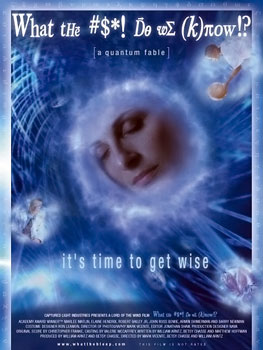
What the Bleep Do We Know!? is a 2004 American pseudo-scientific film that posits a spiritual connection between quantum physics and consciousness. The plot follows the fictional story of a photographer, using documentary-style interviews and computer-animated graphics, as she encounters emotional and existential obstacles in her life and begins to consider the idea that individual and group consciousness can influence the material world. Her experiences are offered by the filmmakers to illustrate the film's scientifically unsupported thesis about quantum physics and consciousness.
Political censorship exists when a government attempts to conceal, fake, distort, or falsify information that its citizens receive by suppressing or crowding out political news that the public might receive through news outlets. In the absence of neutral and objective information, people will be unable to dissent with the government or political party in charge. The term also extends to the systematic suppression of views that are contrary to those of the government in power. The government often possesses the power of the army and the secret police, to enforce the compliance of journalists with the will of the authorities to spread the story that the ruling authorities want people to believe. At times this involves bribery, defamation, imprisonment, and even assassination.

Norsefire is the fictional white supremacist and neo-fascist political party ruling the United Kingdom in Alan Moore and David Lloyd's V for Vendetta comic book/graphic novel series, its 2005 film adaptation, and the 2019 television series Pennyworth.
What constitutes as a definition of fascism and fascist governments has been a complicated and highly disputed subject concerning the exact nature of fascism and its core tenets debated amongst historians, political scientists, and other scholars ever since Benito Mussolini first used the term in 1915. Historian Ian Kershaw once wrote that "trying to define 'fascism' is like trying to nail jelly to the wall".

The Lives of Others is a 2006 German drama film written and directed by Florian Henckel von Donnersmarck marking his feature film directorial debut. The plot is about the monitoring of East Berlin residents by agents of the Stasi, East Germany's secret police. It stars Ulrich Mühe as Stasi Captain Gerd Wiesler, Ulrich Tukur as his superior Anton Grubitz, Sebastian Koch as the playwright Georg Dreyman, and Martina Gedeck as Dreyman's lover, a prominent actress named Christa-Maria Sieland.
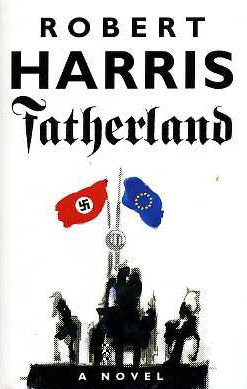
Fatherland is a 1992 alternative history detective novel by English writer and journalist Robert Harris. Set in a universe in which Nazi Germany won World War II, the story's protagonist is an officer of the Kripo, the criminal police, who is investigating the murder of a Nazi government official who participated at the Wannsee Conference. A plot is thus discovered to eliminate all of those who attended the conference, to help improve German relations with the United States.

Wolf Totem is a 2004 Chinese semi-autobiographical novel about the experiences of a young student from Beijing who finds himself sent to the countryside of Inner Mongolia in 1967, at the height of China's Cultural Revolution. The author, Lü Jiamin, wrote the book under the pseudonym Jiang Rong; his true identity did not become publicly known until several years after the book's publication.
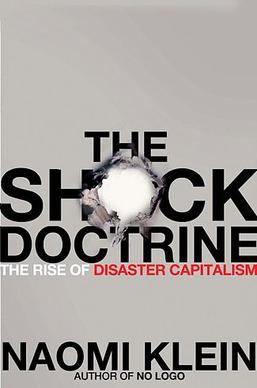
The Shock Doctrine: The Rise of Disaster Capitalism is a 2007 book by the Canadian author and social activist Naomi Klein. In the book, Klein argues that neoliberal free market policies have risen to prominence in some developed countries because of a deliberate strategy of "shock therapy". This centers on the exploitation of national crises to establish controversial and questionable policies, while citizens are too distracted to engage and develop an adequate response and resist effectively. The book advances the idea that some man-made events, such as the Iraq War, were undertaken with the intention of pushing through such unpopular policies in their wake.

The End of America is a 2008 documentary film directed by Annie Sundberg and Ricki Stern, adapted from Naomi Wolf's 2007 book, The End of America: Letter of Warning to a Young Patriot. The film analyzes policy changes made during the Bush Administration, and makes the case that these changes threaten American democracy.
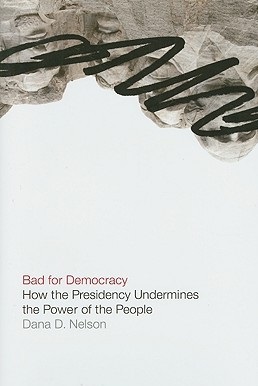
Bad for Democracy: How the Presidency Undermines the Power of the People (2008) is a non-fiction book written by Vanderbilt professor Dana D. Nelson. It is notable for its criticism of excessive presidential power and for her call for substantive political reform. Nelson's focus is not on particular presidents, but she argues that the office of the presidency itself "endangers the great American experiment."

Naomi or Noemi is a given name in various languages and cultures.
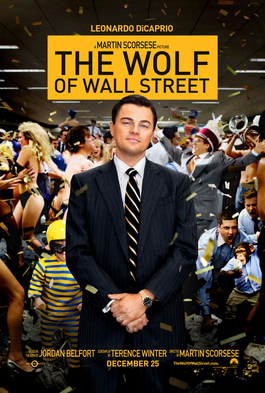
The Wolf of Wall Street is a 2013 American epic biographical black comedy crime film co-produced and directed by Martin Scorsese and written by Terence Winter, based on Jordan Belfort's 2007 memoir of the same name. It recounts Belfort's career as a stockbroker in New York City and how his firm, Stratton Oakmont, engaged in rampant corruption and fraud on Wall Street, leading to his downfall. The film stars Leonardo DiCaprio as Belfort, Jonah Hill as his business partner and friend, Donnie Azoff, Margot Robbie as his second wife, Naomi Lapaglia, Matthew McConaughey as his mentor and former boss Mark Hanna, and Kyle Chandler as FBI agent Patrick Denham. It is DiCaprio’s fifth collaboration with Martin Scorsese.

Freedom for the Thought That We Hate: A Biography of the First Amendment is a 2007 non-fiction book by journalist Anthony Lewis about freedom of speech, freedom of the press, freedom of thought, and the First Amendment to the United States Constitution. The book starts by quoting the First Amendment, which prohibits the U.S. Congress from creating legislation which limits free speech or freedom of the press. Lewis traces the evolution of civil liberties in the U.S. through key historical events. He provides an overview of important free speech case law, including U.S. Supreme Court opinions in Schenck v. United States (1919), Whitney v. California (1927), United States v. Schwimmer (1929), New York Times Co. v. Sullivan (1964), and New York Times Co. v. United States (1971).

Ruscism, also known as Rashism, Russism, or Russian fascism, is a term used by a number of scholars, politicians and publicists to describe the political ideology and the social practices of the Russian state in the late 20th and early 21st centuries, especially during the rule of Vladimir Putin. "Ruscism" and "Russism" are portmanteaus which combine the words 'Russian' and 'fascism'; "Rashism" is a rough transcription of the Russian and Ukrainian equivalents. It is also used in reference to the ideology of Russian military expansionism, and has been used as a label to describe an undemocratic system and nationality cult mixed with ultranationalism and a cult of personality. That transformation was described as based on the ideas of the "special civilizational mission" of the Russians, such as Moscow as the third Rome and expansionism, which manifests itself in anti-Westernism and supports regaining former lands by conquest. The term "Rashist" is also widely used by Ukrainian officials and media to more generally identify members of the Russian Armed Forces and supporters of Russian military aggression against Ukraine.
